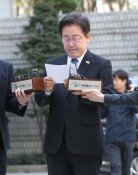Economic leadership is hoped for Pres. Park in commemoration of 70th independence year
Economic leadership is hoped for Pres. Park in commemoration of 70th independence year
Posted August. 03, 2015 07:17,
This August marks the 70th anniversary of Koreas independence and 70th anniversary of Japans defeat in World War II. While this year is historically significant to the both nations, the two have shown quite different economic performances so far. Having spent lost two decades with its long-time low-growth and deflation from the early 1990s, Japan shows a hint of economic revival and vitality. On the other hand, Korean economy runs on empty, raising concerns over the future direction of the Ship of Korea. Based only on economic leadership, the report card of President Park Geun-hye shows poorer performance than Japanese Prime Minister Shinzo Abe. The two have inaugurated around the same time.
Having advocated his economic policies of Abenomics since his inauguration in December 2012, Abe has consistently implemented the strategy for the economic revival. Based upon the three arrows of fiscal stimulus, monetary easing and growth strategy, Abenomics has successfully changed the economic atmosphere in Japan where defeatism used to be endemic even thought it has produced some adverse effects of increased fiscal deficit and decreased national credit rating. Japans economy grew by 1.0 percent quarter on quarter, overtaking Korea in two years who merely grew 0.8 percent. The policy to increase export and profits through the weak Yen led to the revival of Japans manufacturing industry. As the economy turns on and businesses show better performance, as high as 97 percent college graduates landed on jobs and female employment rate hit the highest since 1953. Despite the concerns over Japans growth performance for the second quarter which is to be announced August 17, the economic recovery would maintain its momentum.
Assuming the office in February 2013, President Park has devoted much of her attention to economic democratization and relevant regulations. With the Three Year Plan for Economic Innovation being announced in January 2014, the focus of policy has shifted to increasing domestic demand and reviving the economy but the confusingly-inconsistent policy has brought Korean economy into the trap of low growth. Since the Park Geun-hye administration, Korea grew 2.9 percents in 2013 and 3.3 percents in 2014. It would not be easy to grow some 3 percent this year, either. As unfavorable environment is building up home and abroad, so-called industrial cliff appears to be in full swing, in which Koreas leading industries such as electronics, auto, steel, shipbuilding and chemical falter in unison. Unlike Japan whose younger generation cries in delight as they select their jobs, the one in Korea see no light at the end of the tunnel.
It is not just businesses who make fierce competition on global stage. So do nations and their leaders. Having returned to her job after summer vacation, President Park is expected to stress the importance of the four reforms including labor reform and economic revival. Her competitors are Prime Minister Shinzo Abe of Japan and President Xi Jinping of China. President Park is hoped to have the firm belief and vehemence to strengthen the economy if Korea truly wants to overcome Japan in commemoration of the 70th year of national independence.







